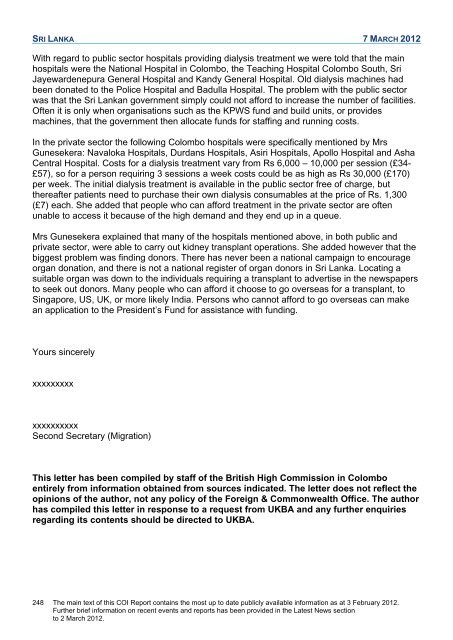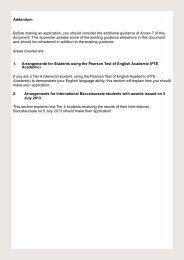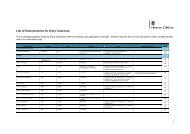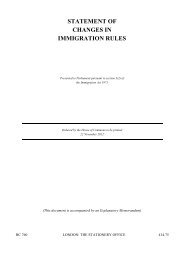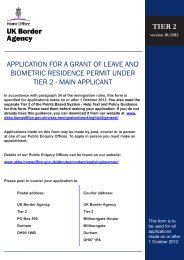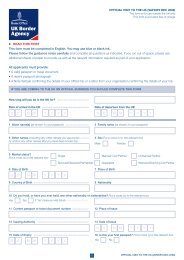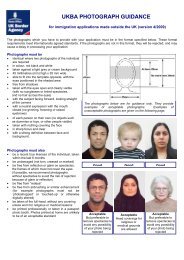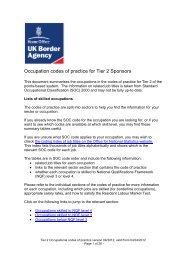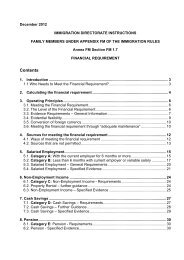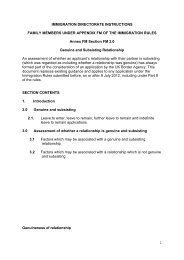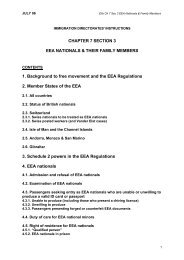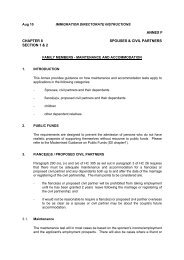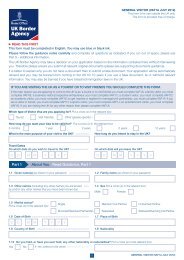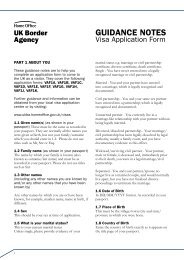COI Report March 2012 - UK Border Agency - Home Office
COI Report March 2012 - UK Border Agency - Home Office
COI Report March 2012 - UK Border Agency - Home Office
You also want an ePaper? Increase the reach of your titles
YUMPU automatically turns print PDFs into web optimized ePapers that Google loves.
SRI LANKA 7 MARCH <strong>2012</strong><br />
With regard to public sector hospitals providing dialysis treatment we were told that the main<br />
hospitals were the National Hospital in Colombo, the Teaching Hospital Colombo South, Sri<br />
Jayewardenepura General Hospital and Kandy General Hospital. Old dialysis machines had<br />
been donated to the Police Hospital and Badulla Hospital. The problem with the public sector<br />
was that the Sri Lankan government simply could not afford to increase the number of facilities.<br />
Often it is only when organisations such as the KPWS fund and build units, or provides<br />
machines, that the government then allocate funds for staffing and running costs.<br />
In the private sector the following Colombo hospitals were specifically mentioned by Mrs<br />
Gunesekera: Navaloka Hospitals, Durdans Hospitals, Asiri Hospitals, Apollo Hospital and Asha<br />
Central Hospital. Costs for a dialysis treatment vary from Rs 6,000 – 10,000 per session (£34-<br />
£57), so for a person requiring 3 sessions a week costs could be as high as Rs 30,000 (£170)<br />
per week. The initial dialysis treatment is available in the public sector free of charge, but<br />
thereafter patients need to purchase their own dialysis consumables at the price of Rs. 1,300<br />
(£7) each. She added that people who can afford treatment in the private sector are often<br />
unable to access it because of the high demand and they end up in a queue.<br />
Mrs Gunesekera explained that many of the hospitals mentioned above, in both public and<br />
private sector, were able to carry out kidney transplant operations. She added however that the<br />
biggest problem was finding donors. There has never been a national campaign to encourage<br />
organ donation, and there is not a national register of organ donors in Sri Lanka. Locating a<br />
suitable organ was down to the individuals requiring a transplant to advertise in the newspapers<br />
to seek out donors. Many people who can afford it choose to go overseas for a transplant, to<br />
Singapore, US, <strong>UK</strong>, or more likely India. Persons who cannot afford to go overseas can make<br />
an application to the President‘s Fund for assistance with funding.<br />
Yours sincerely<br />
xxxxxxxxx<br />
xxxxxxxxxx<br />
Second Secretary (Migration)<br />
This letter has been compiled by staff of the British High Commission in Colombo<br />
entirely from information obtained from sources indicated. The letter does not reflect the<br />
opinions of the author, not any policy of the Foreign & Commonwealth <strong>Office</strong>. The author<br />
has compiled this letter in response to a request from <strong>UK</strong>BA and any further enquiries<br />
regarding its contents should be directed to <strong>UK</strong>BA.<br />
248 The main text of this <strong>COI</strong> <strong>Report</strong> contains the most up to date publicly available information as at 3 February <strong>2012</strong>.<br />
Further brief information on recent events and reports has been provided in the Latest News section<br />
to 2 <strong>March</strong> <strong>2012</strong>.


